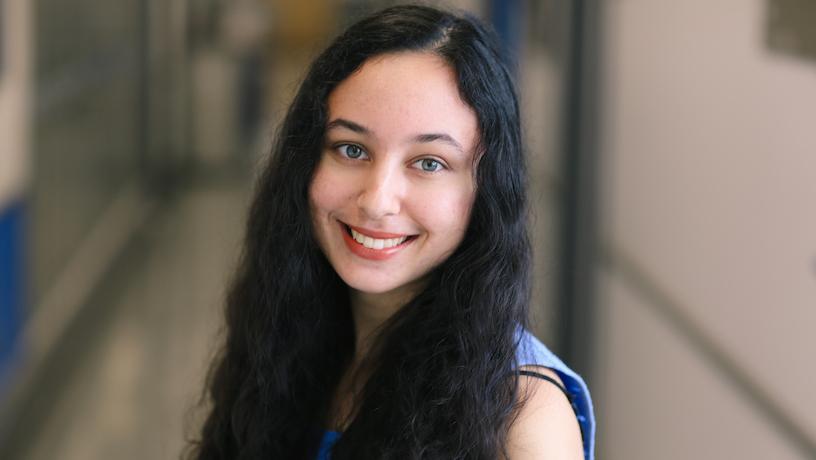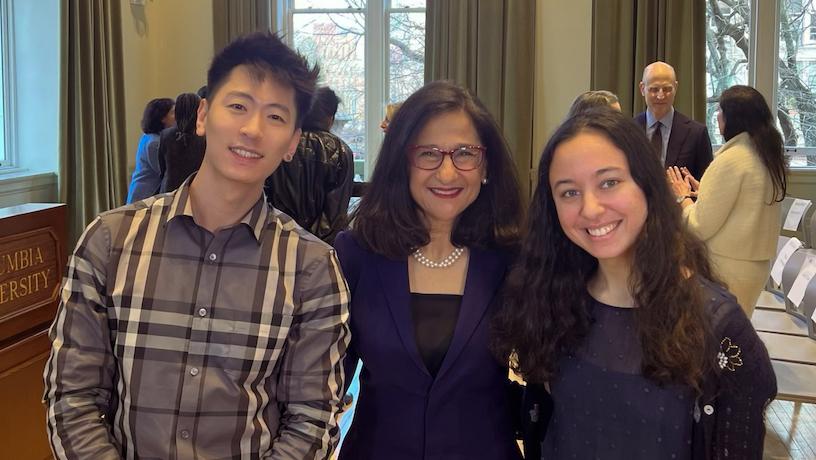Women’s History Month Highlight: Kennedy Salamat
She represents just one of the many female talents at Columbia Engineering. Meet computer science undergrad Kennedy Salamat, who shares her experience & achievements as a woman in STEM in celebration of Women’s History Month

Women’s History Month is a time to not only recognize women’s contributions to society, but to reflect on ways to better gender equality and women’s rights. In the past few years, Columbia Engineering has made amazing progress in attracting and retaining female talent: more than 51% of incoming first-year students are women, and female faculty has doubled over the past decade.
As undergraduate student Kennedy Ariana Salamat ’23 finishes her final semester at Columbia Engineering, she took time to reflect on her time at Columbia, share her experience of being a woman in STEM, and celebrate her achievements as an engineer for humanity.
Leading In and Out of the Classroom
A Maryland native from mixed-race background, Salamat is studying computer science on the Intelligent Systems track on top of taking pre-med classes. She hopes to use this combination to pursue an MD/PhD. “I aspire to be a physician scientist!” she states.
While the workload seems intense, this doesn’t faze Salamat. Prior to attending Columbia, she was recognized alongside 18 other students as an Egleston scholar, an exclusive program for the top 1% of Columbia Engineering applicants that recognizes students for their extraordinary achievements and promise as researchers and scholars. Embodying the mission and vision of Columbia Engineering for Humanity, Salamat interned at the National Cancer Institute of the National Institutes of Health while still in high school, where she used cryo-electron microscopy techniques to image hemoglobin at near-atomic levels.
Outside of the classroom, Salamat is an active participant in the Columbia community, serving multiple roles on the Engineering Student Council (ESC).
“During my time at ESC, I’ve worked to establish campus traditions to build community, like the SEAS Gala Boat Cruise and Explore NYC Initiative, which provides students with free tickets to cultural events and attractions in New York,” she explains. “Under my leadership, ESC also formed a new committee in the hopes of creating a more inclusive space for women in engineering, and underrepresented groups on the council.”
Engineering for Humanity
“I chose SEAS because of the many cutting edge opportunities present for undergraduates,” said Salamat, who was initially drawn to Columbia Engineering’s unique offering to do research in the heart of New York City. Just last semester, she had the opportunity to do research at the Columbia in Paris program, working with a professor at Université Paris-Saclay on a project utilizing Natural Language Processing to visualize relationships between articles in databases. Prior to that, her internship focused on growing miniature human hearts to send into space.
Her research, as well as her other interests in linguistics, art and music, has helped her understand the meaning of Columbia Engineering’s vision.
“Engineering for humanity means remaining focused on wielding engineering as a tool to make a truly meaningful and lasting mark on the world. It means taking into consideration the implications of technologies that you are designing and making sure that all of your creations drive positive change.”
The Impact of Women in STEM

Kennedy Salamat with Columbia’s next president, Nemat Shafik
In the mid-19th century, UK mathematician and writer Ada Lovelace proposed what is known as the Analytical Engine, a computer programmed with a series of simple instructions to perform complex calculations. Known as the first computer programmer, Lovelace is still an inspiration more than a century later to Salamat. “She is responsible for the development of the computer science field, and thus, all of the technologies that have emerged from CS would not have ever been possible without her.”
Salamat will join many other female engineers, researchers and scholars to continue the legacy of innovation and hopes to be a form of inspiration for other women.
“Being a woman in engineering means being confident in yourself and your scientific expertise,” she states. “It means walking into rooms where you might be the only woman, and lifting your voice to make sure that it is heard. It means inspiring more women to get involved in STEM, and working towards changing the face of STEM. It means being a positive change for the world.”
